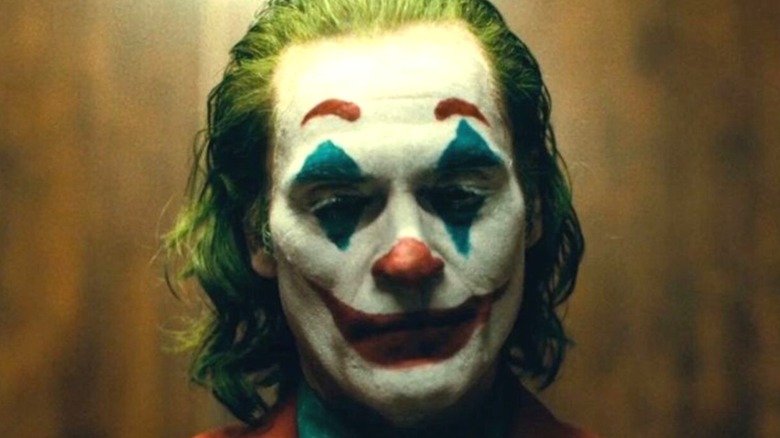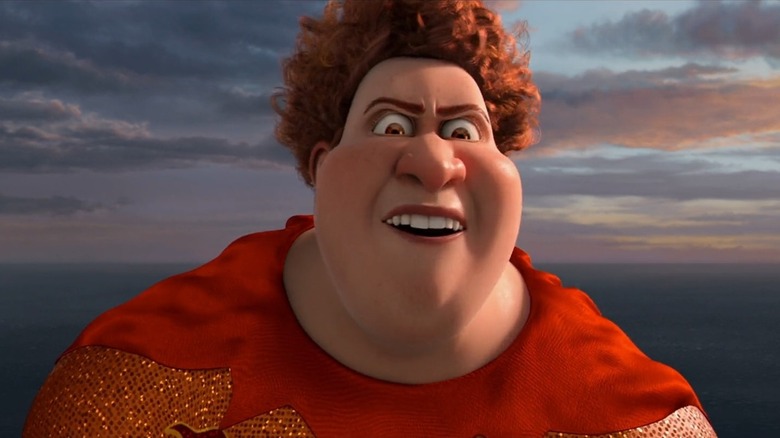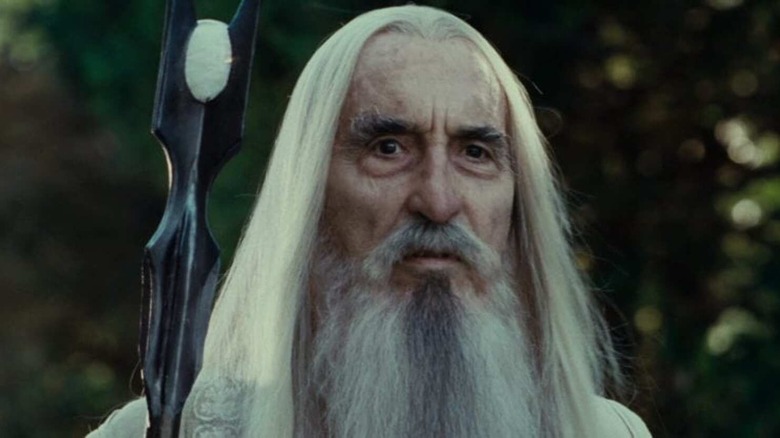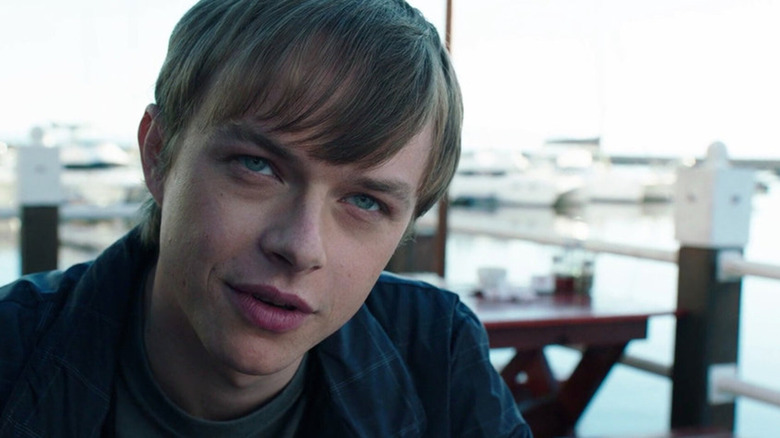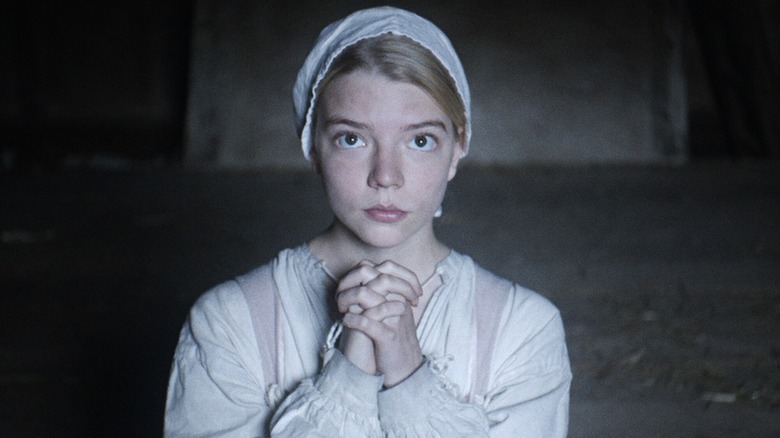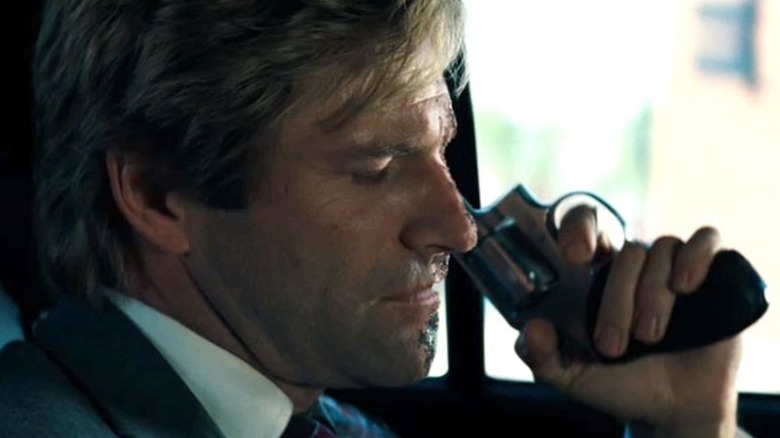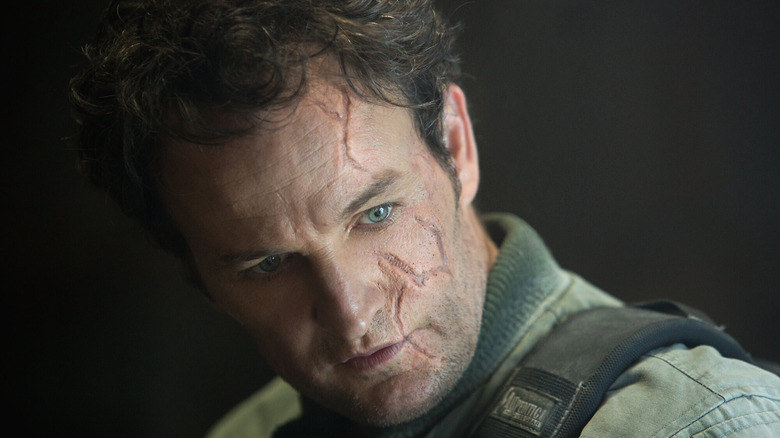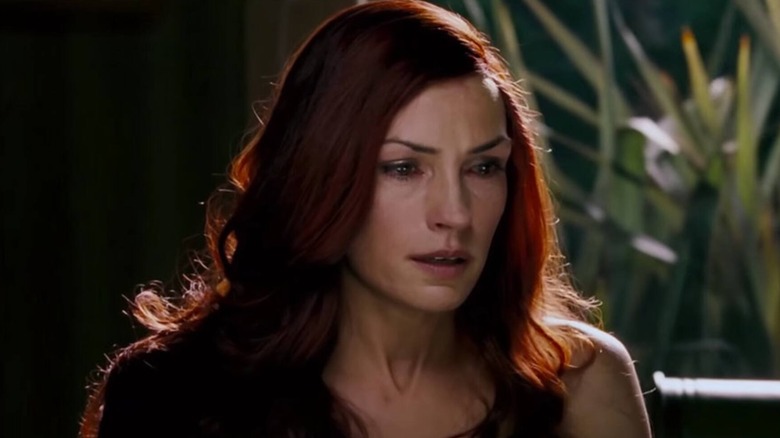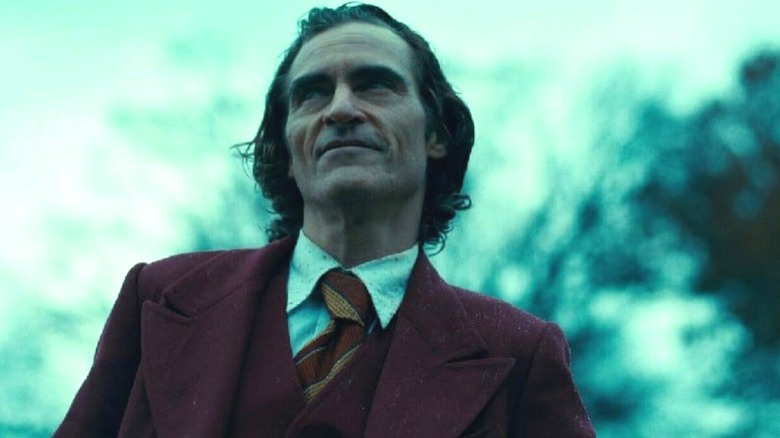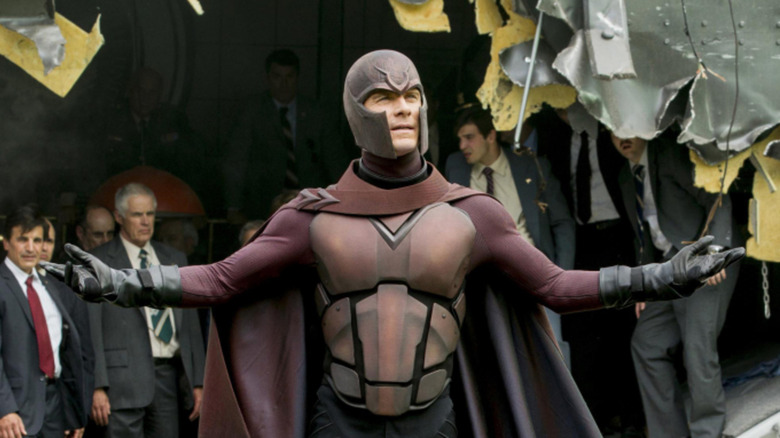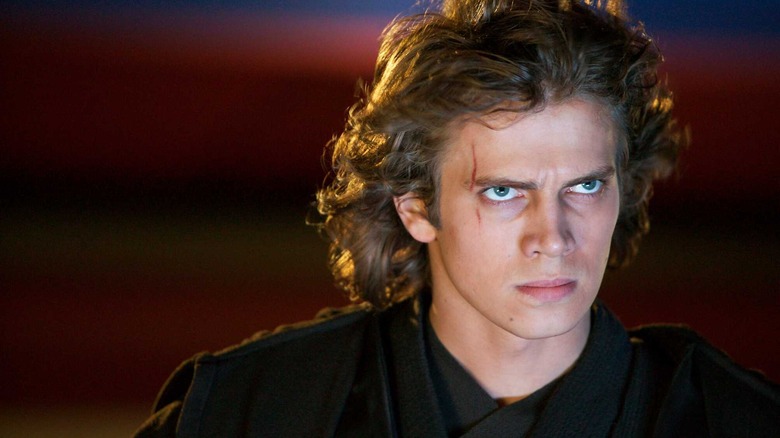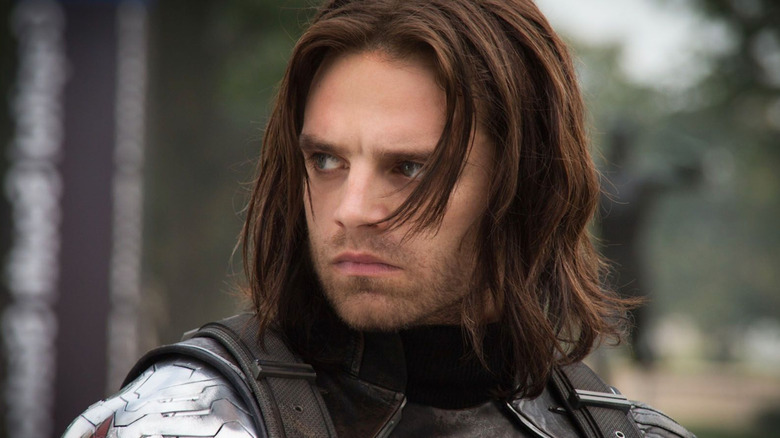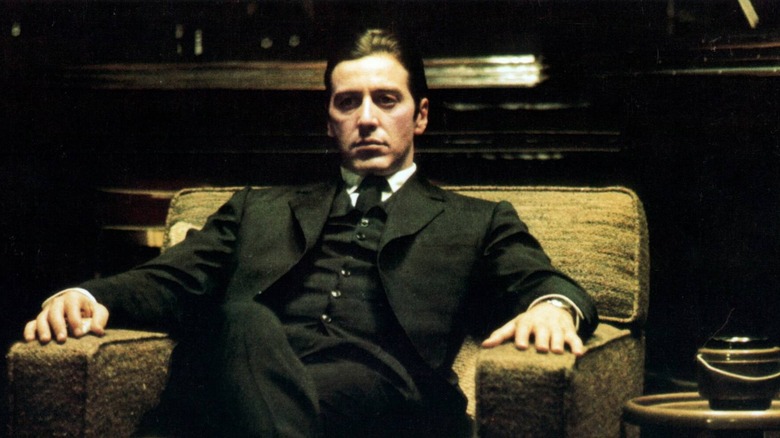Movie Heroes That Epically Turned Into Villains
Everyone loves a good villain, but people love it even more when that villain has a compelling backstory and a fully fleshed out character. One-note villains that are evil for the sake of being evil have long since become passé. Today, it's all about the villain who audiences can sympathize with, or at least understand where they're coming from, like Thanos in "Avengers: Infinity War."
A noted subsection of the sympathetic villain category is the villain who starts out good before turning evil through a tragic series of events. This type of villain is more tricky to pull off. All too often, the audience keeps rooting for the villain to some day turn good again, and this turns the character into more of an anti-hero than a proper villain.
But sometimes, the turn of a character to the dark side is seemingly too complete for there ever to be hope of redemption. Throughout the history of cinema, there have been a number of characters that started out noble and righteous but ended up becoming thoroughly, unforgivably evil. Here are 13 such characters whose heartbreaking transformations into villains left deep impressions on audiences.
Hal Stewart/Tighten (Megamind)
2010's "Megamind" did for comic book villains what "Shrek" did for fairytale villains, in that it showed that a bad guy can also become the hero under the right circumstances. But the movie also showed the opposite happening with Hal Stewart (Jonah Hill), a hapless cameraman deeply in love with news reporter Roxanne Ritchi (Tina Fey).
In the film, supervillain Megamind (Will Ferrell) grows bored after finally defeating his archenemy, a Superman pastiche called Metro Man (Brad Pitt). To get a taste of their legendary battles once again, Megamind secretly doses Hal with a concoction that grants him superpowers. Thus, Hal becomes the new superhero "Titan," which he misspells as "Tighten." At first, Hal behaves as any superhero should, righting wrongs and fighting Megamind to protect the city.
But soon Hal's personal desires start overtaking his duty towards his city, particularly his desire to make Roxanne love him. In fact, Hal even offers to team up with Megamind so they can rule the city together. In the end, Megamind realizes he has unwittingly created a new supervillain in Tighten and is forced to take on a more heroic role to undo the damage wrought by a crazed Hal.
Saruman the White (The Lord of the Rings)
At the time of the events of "The Lord of the Rings" trilogy, Saruman the White had already completed his descent into the dark side and become a major villain. But later movies in "The Hobbit" series that were set in the past showed just how noble and heroic Saruman had once been.
Taking the events in their proper order, Saruman the White starts out as the leader of the Istari, who are powerful angels sent to the land of mortals in human form by the god deity of Middle-earth. The Istari are tasked with challenging the power of Sauron, who had once been a lieutenant of Morgoth but had become the new ruling evil of Middle-earth after Morgoth's fall. For centuries, Saruman leads the charge in the battle against Sauron, advising the armies of man, elf, and dwarf and amassing a vast fount of knowledge that he keeps in his stronghold, Isengard.
But even though Saruman personally battles and defeats Sauron at one point when the latter is called the Necromancer, over time the lure of power proves too much. Eventually, Saruman's priority changes from stopping Sauron to expanding his own influence over Middle-earth. It is this newly power-hungry Saruman who comes into conflict with Gandalf and his allies during the events of "The Lord of the Rings," at the end of which Saruman meets his death at the hands of his own servant Wormtongue.
Andrew Detmer (Chronicle)
There was a time when actor Dane DeHaan and filmmaker Josh Trank were being billed as the next big thing in Hollywood. The main reason for that sentiment was 2012's twisted take on superhero origin stories, "Chronicle," written and directed by Trank and starring DeHaan in the lead role as Andrew Detmer.
Andrew starts out like an alternate version of Peter Parker. He gets bullied in school and at home by his father, and his mother is battling cancer. At his lowest point, Andrew and two of his friends come across a meteorite-like object that grants them superpowers. Just as Peter first used his spider-powers for personal gain, Andrew and his friends use their powers to play pranks, fly around the town, and gain popularity at their high school.
But while Peter Parker eventually became Spider-Man, Andrew's powers take him in a darker direction. He accidentally kills one of his friends and tries to use his powers to rob a bank so he can pay for his mother's medication. A series of misadventures later, Andrew reaches his breaking point and starts destroying everything around him like a full-fledged supervillain. Although Andrew's final fate is left ambiguous, it's clear he has reached a point of no return in terms of ever being a good guy again.
Thomasin (The Witch)
2015's horror-drama "The Witch" was filmmaker Robert Eggers' maiden cinematic effort, where he ably proved his talent for telling harrowing tales of desperation and conflict. "The Witch" was also Anya Taylor-Joy's breakout role in the lead as Thomasin, the daughter of English settlers William and Katherine.
Set in the 1630s, the movie follows William and his family as they are expelled from a puritan colony for William's controversial views. The family is forced to move to a desolate area near the edge of the woods, where they must quickly try to store up enough food for the long winter. Problems are compounded by a coven of witches who dwell in the woods — and who have decided to make William and his family their latest victims.
Thomasin starts out a good and virtuous character who tries her best with to get along with the circumstances of her life. But gradually, the bitterness of the family members towards each other, the paranoia surrounding their religious dogma, and the machinations of the witches all serve to overwhelm Thomasin's conscience. In the end, she has no choice but to join the very same coven of witches that destroyed her family just so she can survive.
Harvey Dent/Two-Face (The Dark Knight)
"The Dark Knight" is generally considered one of the greatest superhero movies ever made (if not the best of all). A large part of the praise comes in for the realism of the movie. You actually feel the characters of the film could exist in the real world, which is what made Harvey Dent's (Aaron Eckhart) descent into becoming Two-Face all the more heartbreaking.
In the beginning, Harvey is the man that even Batman wishes he could be. Known as the "White Knight" of Gotham, Harvey is the hotshot new district attorney who promises to be uncompromisingly tough on crime. But Harvey's good intentions can't withstand the onslaught of the diabolical Joker (Heath Ledger), who's determined to prove that deep down, everyone else is just as twisted and evil as he is.
Thanks to a series of tragedies engineered by the Joker, Harvey loses the love of his life as well as his faith in the judicial system. It's this bitter realization that the system will always be rigged against decent people that triggers Harvey's transformation into the villainous Two-Face. Harvey's journey gave rise to one of the most popular quotes in modern cinema: "You either die a hero, or you live long enough to see yourself become the villain."
John Connor (Terminator Genisys)
For an entire generation of action and science fiction movie fans, John Connor is right up there with Neo and Luke Skywalker as the archetypal "Chosen One" character. As the leader of the resistance against the evil A.I. Skynet, John was destined to save humanity in the future war between man and machines.
This aspect of John's legacy was hyped up by among two of the greatest sci-fi movies ever made, "Terminator" and its sequel. But then 2015's "Terminator Genisys" decided to take the whole thing in a new direction. It is revealed that during one of the franchise's patented time-travelling hijinks, John Connor (Jason Clarke) had been attacked by the T-5000 terminator. As a result, John is infected with machine phase matter and turned into a terminator himself.
Seeing the reveal of John Connor as an evil terminator was a pretty mind-blowing moment for longtime fans, even though many were also critical of the decision to show John in this new, evil light. But the whole arc was still better-received than what the makers decided to do to John Connor in "Terminator: Dark Fate."
Scrappy-Doo (Scooby-Doo)
Scooby-Doo's nephew Scrappy-Doo in the original "Scooby-Doo" cartoons was what the Cowardly Lion from "Wizard of Oz" wishes he could be. Although a mere pup, Scrappy was filled to the brim with courage and was always willing to run straight into trouble with no fear. Scrappy was a popular character among fans, which is why it made sense to include him in the 2002 live-action "Scooby-Doo" film.
Unfortunately, fans got more than they were looking for with the live-action Scrappy. It is made clear early on that this version of Scrappy is quite full of himself. He believes he has been solely responsible for the success of the Mystery Inc. gang and announces himself as their new leader. This prompts the gang to unceremoniously dump Scrappy, and the little troublemaker starts plotting his revenge.
All of this leads to the final act of the movie, in which Scrappy is revealed to be the mastermind behind the story's main crimes. To cap it all off, Scrappy uses supernatural means to transform into a hulking demonic entity that tries to destroy Mystery Inc. In the end, Scooby and the gang are able to stop his power-hungry nephew, but the relationship between Scooby and Scrappy is unlikely to ever be repaired.
Jean Grey (X-Men: The Last Stand)
"The Dark Phoenix Saga" is possibly the most famous "X-Men" comic storyline of all time. Naturally, the live-action movies decided to incorporate the storyline into their series, and that's how movie audiences got to see righteous hero and general voice of reason Jean Grey transform into the genocidal supervillain Phoenix.
In 2006's "X-Men: The Last Stand," we see Jean (Famke Janssen) return from the dead after heroically sacrificing her life to save the other X-Men in "X2." But this new version of Jean is far removed from the original, which she proves in her first scene by killing Scott (James Marsden), the love of her life. Matters get even worse when Magneto manages to sway Jean over to his side of the mutants-vs.-humans debate.
The movie ends with Jean looking to kill basically everyone around her, until a sobbing Wolverine is forced to stab her to death. Years later, the franchise made another attempt to adapt the "Phoenix" storyline for the big screen with 2019's "X-Men: Dark Phoenix." It seems as heroic as Jean can be, fans love nothing more than watching her lose it and start attempting to destroy all of humanity.
Arthur Fleck (Joker)
When it was first announced that Batman's archenemy Joker would be getting an origin movie, fans didn't know what to expect. Their confusion deepened when it was revealed that Batman would not be a part of the film. But 2019's "Joker" proved that even one of the worst comic book villains ever can win the sympathy of the audience with a compelling enough backstory.
"Joker" focuses on struggling clown actor Arthur Fleck (Joaquin Phoenix) and his attempts to make it as a stand-up comic. Arthur is far removed from the iconic Clown Prince of Crime at first. He is a simple man who likes to make people laugh, wants to help his ailing mother get better, and dreams of performing stand-up in front of cheering crowds instead of the indifferent audiences he faces every day as an unknown comic.
Over time, we see Arthur's attitude change as life continuously beats down on him. He gets assaulted, made fun of for his medical condition, and fired from his day job. Even worse, his stand-up routine is used to make a mockery of Arthur's comic talent by his favorite big-time talk show host. When Arthur finally snaps and becomes the maniacal Joker, there is little surprise, just a sense of inevitability.
Magneto (The X-Men)
Over the years, Max Eisenhardt, aka Magneto, has pulled a "Saruman" in the sense that the first few movies he was introduced in showed Magneto as a full-fledged villain, but later movies set in the past showed how he, too, had once been noble and heroic.
Max Eisenhardt's tragic story begins during World War II, when his entire family is massacred in concentration camps. Max is spared because he's found to be a mutant, and the Nazis want to make use of his power over metal for their own ends. When Max manages to escape, he takes on the identity of Erik Lehnsherr and dedicates his life to destroying his former enemies.
In the middle of his mission, Erik meets Charles Xavier and the other X-Men. They inspire him to step away from his vengeful path and become a force for good. Together, Erik and Charles travel the world together, finding and recruiting young mutants in need of guidance and safety.
But in the end, Erik can't ignore his hardline sensibilities. Over time, he became convinced that humans and mutants could never co-exist. And so Erik created his own rival faction of the Brotherhood of Mutants, dedicated to a new world order where Mutants ruled over mankind. Erik's descent into supervillainy is all the more tragic when you think about how close he came to becoming a genuine hero alongside Charles, instead of turning into the X-Men's arch-enemy.
Anakin Skywalker (Star Wars)
The poster child for "good boy gone bad." Anakin Skywalker (Hayden Christensen) was all set to become the "chosen one," a legendary hero destined to bring balance to the Force. But that was not to be. The promised messiah instead became a great threat to the galaxy in the form of Darth Vader, and a cautionary tale against placing all your "savior" eggs in one unstable basket.
Anakin's career starts out promisingly enough in "Star Wars: Episode I – The Phantom Menace." He's strong in the force, stronger perhaps than even Master Yoda. Anakin becomes known as the "hero with no fear," who can go on the most dangerous missions alongside his mentor Obi-Wan Kenobi and always emerge victorious. After falling in love with and secretly marrying Senator Padmé Amidala of Naboo (Natalie Portman), Anakin's all set to become a caring family man.
But all that changes when Anakin begins to have visions of his wife dying during childbirth. Obsessed with saving her, Anakin is lured to the Dark Side by the Sith and takes on the moniker "Darth Vader." In his new identity, Anakin turns against his former allies and is ultimately very nearly killed in a pitched battle with Obi-Wan. After being left for dead, his broken body is rebuilt into the classic version of Darth Vader that fans know and love. And so Anakin's fall from grace was complete, as the former Jedi knight severed all ties to his former life.
Bucky Barnes (MCU)
The Marvel Cinematic Universe is filled with tragic figures, from Bruce Banner struggling with his inner monster to Natasha Romanoff eternally trying to capture the feeling of the family she never had. One of the most tragic figures in the entire franchise is Bucky Barnes (Sebastian Stan), later to be known as the dreaded master assassin the Winter Soldier.
Bucky's MCU journey starts well. He volunteers to fight in World War II alongside his childhood friend Steve Rogers. Unlike Steve, Bucky is accepted on the first try. Later, after Steve is given the super soldier serum and embarks on a dangerous mission, Bucky is right by his side until he's seemingly taken out by HYDRA forces.
But that's only the start of Bucky's nightmare. He pops up decades later in present times as the Winter Soldier, a brainwashed assassin who has received the same serum as Steve Rogers. With the help of Steve, Bucky is finally able to break his conditioning, but the many murders he has committed as an assassin continue to haunt him, along with the question of whether he'll ever be able to completely absolve himself of the guilt.
Michael Corleone (The Godfather)
Michael Corleone remains one of the most iconic, and most tragic, figures in all of cinema, one who continues to inspire villains and anti-heroes today. Played to perfection by Al Pacino in "The Godfather" movies, Michael's struggle between his decent nature and his legacy as the son of a mafia boss drives the main plot of the series.
When first we meet Michael, it is clear that he has no interest in following in his father Vito Corleone's footsteps as the the new don of the Corleone crime family. For his part, not even Vito wants Michael to become embroiled in the family business. Instead, Vito dreams of seeing his son in the highest echelons of political office. But that's not what fate has in mind.
After an attack is made on Vito's life, Michael has no choice but to follow in his father's path. He becomes a member of the Corleone crime family, showing a talent for the work that surprises his friends and enemies alike. Michael's civilian life continues to tug at him, but he has no choice but to delve deeper into a life of crime once he finally succeeds his father as the new don. And thus, the cycle of violence continues for the next generation of Corleones.
